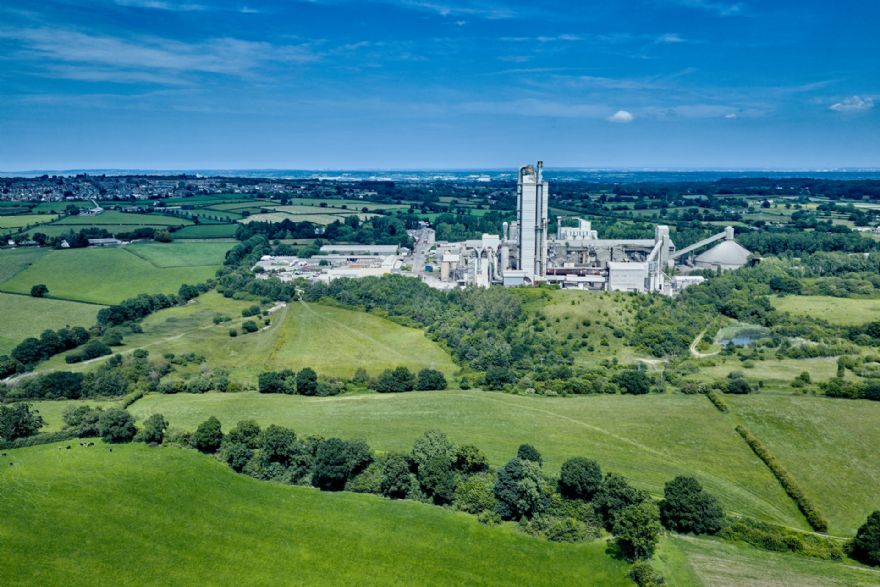 Heidelberg Materials
Heidelberg Materials has officially entered the execution phase of its
Padeswood CCS project in North Wales, following the completion of a funding agreement with the UK Government. The facility is set to become the world’s first cement plant with a fully decarbonised production process, designed to capture approximately 800,000 tonnes of CO
2 annually — virtually all of the site’s emissions.
This development follows the launch of Brevik CCS in Norway earlier this year, which marked the world’s first industrial-scale carbon-capture facility in a cement plant. Padeswood will be the second Heidelberg Materials site to produce ‘evoZero’, the company’s carbon captured ‘net zero’ cement, but at a significantly higher capacity. The expansion is expected to dramatically increase the availability of evoZero across Europe, supporting the continent’s transition to low-carbon construction.
The UK Government’s support for the project was announced last week, with Energy Minister Michael Shanks stating: “Our clean energy mission means good jobs, regional growth, and investment for local communities. This trailblazing project in a cement plant showcases the North Wales workforce on the global stage – leading the charge in the clean industries of the future and powering Britain’s reindustrialisation through this UK-first venture.”
National ambitionsThe funding aligns with national ambitions to reduce CO
2 emissions while stimulating economic growth through infrastructure and construction. Heidelberg Materials is leveraging its experience from Brevik to accelerate delivery and reduce risk at Padeswood, particularly in integrating capture technology into ongoing operations and coordinating CO
2 transport and storage.
Dr Dominik von Achten, chairman of the managing board of Heidelberg Materials UK, said: “This milestone comes just a few months after the launch of our Brevik CCS facility. It demonstrates the momentum behind our ‘net zero’ agenda. At Padeswood, we have an invaluable advantage — we are building on the knowledge and learnings developed at Brevik by working closely with the teams behind its success – sharing best practices with our UK colleagues, whose expertise and enthusiasm will drive the project forward.”
The Padeswood CCS facility will capture emissions from both the kiln and the combined heat and power (CHP) plant. Notably, the kiln emissions include CO
2 from biomass fuels derived from domestic food, wood, and paper waste — materials that cannot be economically recycled. By capturing these biogenic emissions, the plant has the potential to become a carbon sink. This is made possible by using a high proportion of plant-based alternative fuels that absorb CO
2 during their lifecycle. When these emissions are captured and stored, the overall atmospheric CO
2 is reduced.
Dr Katharina Beumelburg, chief sustainability and new technologies officer, highlighted the broader impact: “Padeswood CCS represents a transformative leap for the entire hard-to-abate sector, both from a technological and a sustainability perspective. With evoZero from Padeswood, we will enable ambitious sustainable construction projects with measurable and verifiable CO
2 reductions – driving real change and shaping the future of our built environment.”
Carbon captured ‘net zero’ cementJon Morrish, member of the managing board responsible for Europe, praised the UK’s policy framework. He said: “The UK Government has created a strong and supportive framework for industrial decarbonisation, which should serve as a blueprint for other countries in Europe. We applaud its commitment to helping de-risk and enable a successful business case for projects like Padeswood CCS. It will be our second plant in Europe to produce evoZero carbon-captured ‘net zero’ cement, helping our customers and the wider construction industry achieve their climate targets.”
Construction of the carbon capture facility is scheduled to begin later this year, with commissioning expected in 2029. Captured CO
2 will be compressed and transported via underground pipeline for secure storage beneath Liverpool Bay, as part of the HyNet North West project.
The economic impact on North Wales will be substantial. The project will secure over 200 existing jobs, create around 50 new positions, and generate up to 500 additional roles during the construction phase. As Heidelberg Materials continues to scale its carbon-capture capabilities, Padeswood CCS stands as a flagship example of industrial innovation driving climate action and regional development.